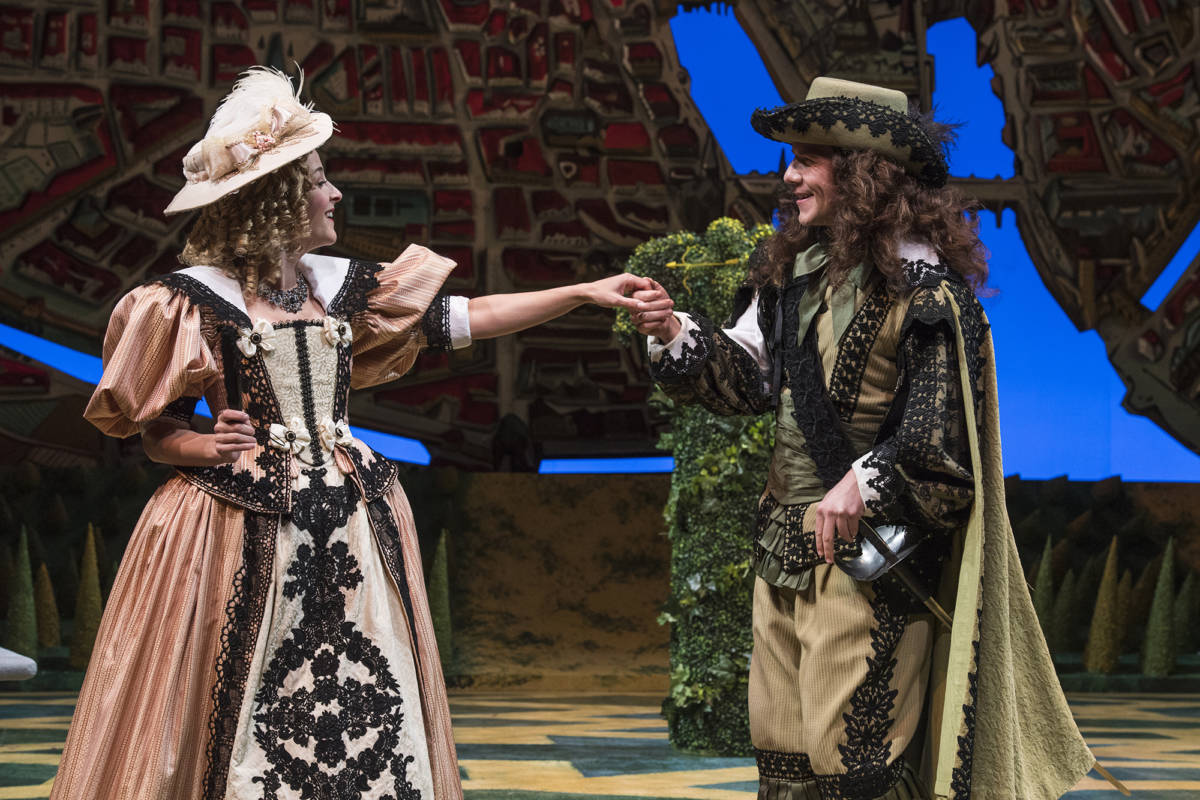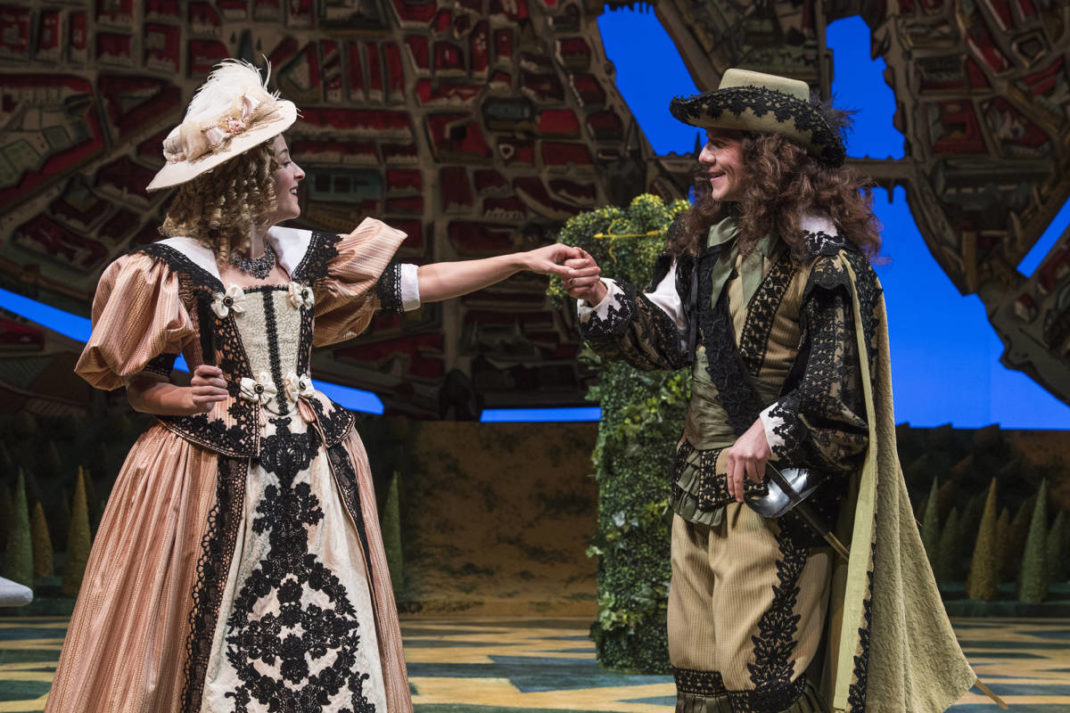
Charm, inside jokes minimize the tired tropes in “The Liar” at Utah Shakespeare Festival
It might be called “The Liar,” but this current Utah Shakespeare Festival production is all about the ladies.
Adapted by David Ives from Pierre Corneille’s French farce, “The Liar” has a particular brand of humor. If you like dad jokes or films like “Wild Hogs,” you’ll probably think it’s hilarious. If you’re under the age of 50 … well.
At least that’s what it feels like at first. There were plenty of people laughing on opening weekend, but it was most definitely an older crowd. The dialogue is filled with joke after joke, all encapsulated in rhymes that are often creative and nearly always cheesy.
It’s silly. The humor feels a bit cheap. There’s an entertainment value, but it seems lightweight.
Then Betsy Mugavero enters. Up to this point, it has only been male actors on stage, primarily Brandon Burk as Clinton and Jeb Burris as Dorante, the titular liar. Though skilled, their performances are not quite enough to elevate the dialogue beyond its inherent cheesiness.
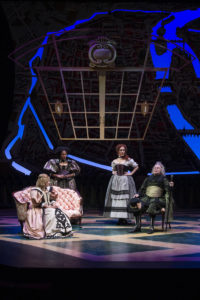
Not so with Mugavero, who owns this play as Clarice, a young woman wooed by Dorante, even though she is already secretly betrothed to Alcippe, played by Wayne T. Carr with a brilliantly restrained rage. The difference between Mugavero’s delivery and the male actors is her complete embrace of the character and Clarice’s lines.
For Mugavero, these are more than words repeated for humorous effect. Her diction and phrasing are masterful. Her comedic timing is spot-on. She puts her whole self into the role. She delivers the lines not only with her lips but her entire face. This is next-level acting.
That said, the play was still fresh on opening weekend, and it’s probable that the rest of the cast will become more comfortable with the humor after a few more performances. Comedy can be especially tricky that way, especially when it comes to timing.
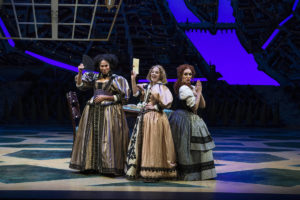
However, both of the other women in this play also deliver smart performances. At first, Aidaa Peerzada, seems to be holding back as Clarice’s friend Lucrece. Soon, you realize she really is, but on purpose. That’s the way her character is written. And Peerzada handles Lucrece’s slow-build with elegance.
And much of the play’s most fulfilling humor comes from Katie Cunningham, who plays the dual roles of Isabelle and Sabine, twin servants who are “vivacious” and “puritanical,” respectively. Sure, it’s the tired Shakespearean cliché of Mistaken Identity With Twins, but Cunningham injects it with fresh, new life.
In fact, the main plot of the play is based on the tired mistaken identity cliché with Dorante believing that Clarice is named Lucrece. And yes, it gets old as quickly as it does with some of Shakespeare’s lesser works.
While this production of “The Liar” has room to grow, the cast does a fine job with the problematic source material and end up with a play that is, at the end, quite charming.
But there are plenty of other elements of “The Liar” to enjoy. One of them is the set’s gorgeous backdrop. Scenic designer Jason Lajka has created a stunningly beautiful map of Paris where the water of the Seine changes color from scene to scene.
Another is the tendency for subtle references to pop culture (a lightsaber duel), Bard culture (slightly tweaked Shakespearean lines), and local culture (Burris’ show-stopping Brian Vaughn impersonation). These “inside jokes” are among the more delightful elements of the play.
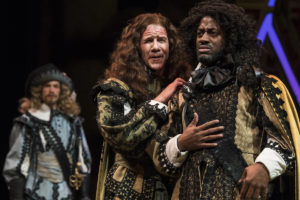
Speaking of delight, between each scene we hear what sounds like the strains of a harpsichord. But there’s something familiar about the melodies. Pop culture aficionados will be able to identify most of them. Without ruining the fun by naming them here, they run the gamut from ‘80s sitcoms to Broadway musicals to blockbuster science fiction films.
Still, after intermission, the play faces that second-half slowdown as the mistaken identity tropes become infinitely more tiresome. Thankfully, there are glimmers of redemption. Peerzada turns Lucrece into the heart of the play while even Burris’ notorious liar becomes endearingly sweet.
While this production of “The Liar” has room to grow, the cast does a fine job with the problematic source material and end up with a play that is, at the end, quite charming. It may not be one of the best plays to appear on the stages of Utah Shakes, but it does have its moments … and its Mugavero.
The Utah Shakespeare Festival’s production of “The Liar” continues through Oct. 13 in the Randall L. Jones Theatre at Southern Utah University’s Beverley Center for the Arts in Cedar City. Tickets are $32–$75. Visit bard.org or call (800) 752-9849.
Articles related to “Charm, inside jokes minimize the tired tropes in ‘The Liar’ at Utah Shakespeare Festival”
Utah Shakespeare Festival’s “An Iliad” is a powerful rumination on the nature of war
The Stage Door presents “Young Frankenstein” at The Electric Theater
Get your Falstaff on with “The Merry Wives of Windsor” at the Utah Shakespeare Festival

